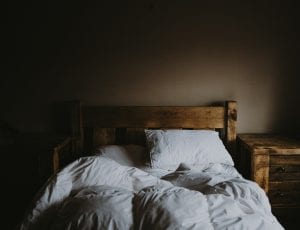As the result of a consistent lack of sleep, you may also develop mental health challenges like depression or even anxiety.
Delayed Sleep Phase Syndrome (or DSPS for short) is often mistaken for insomnia. However, the two conditions are actually not alike, and they are treated very differently.
Let’s first look at the basics of DSPS, what some of the symptoms are, and how it can be managed and treated.
What Is Delayed Sleep Phase Syndrome?
DSPS is a circadian rhythm sleep disorder – essentially, it’s an issue with your internal body clock.
Those who suffer from the condition can’t fall asleep when most of the population does. In fact, sleep is delayed by at least two hours, even when you are feeling particularly tired.
Some confuse the condition with insomnia, which is the inability to fall asleep in general. It’s also often confused with being a night owl, which means you are choosing to stay up late or simply work better later in the day.
What Are Some of the Symptoms of DSPS?
The most common symptom associated with delayed sleep phase syndrome is difficulty falling asleep at what is typically considered a normal time. Your body clock will usually keep you awake until several hours after midnight.
Since you have already fallen asleep late, chances are, you won’t find it easy to wake up at a socially acceptable hour. This might cause you to be late for work, and you might also find yourself irritable in the mornings.
Feeling sleepy, drowsy, and slow during the day is also very common, especially as you are consistently not getting the sleep you actually need. This will also worsen your mood, and it can compromise everything from your productivity and performance to your relationships with family and friends.
As the result of a consistent lack of sleep, you may also develop mental health challenges like depression or even anxiety.
What Causes DSPS?
The condition is often caused by genetics, and you may have inherited it from a family member who has also suffered from it.
Mental health disorders like anxiety, depression, or OCD may also be the underlying cause of DSPS.
Oddly enough, insomnia and poor sleep hygiene can also cause DSPS.
What Are the Consequences of DSPS?
If left untreated, DSPS can lead to chronic sleep deprivation. It will take you some time to go through all of its stages, but it can ultimately cause some serious damage to both your mental and physical health.
We’ve already mentioned the possibility of developing anxiety or depression, along with the mood swings you may be experiencing.
The less quality sleep you get, the more your immunity will suffer. Also, a consistent lack of quality sleep will make you more prone to weight gain. Your overall wellbeing will be compromised, as every single facet of our bodies requires sleep to function properly.
How Can You Manage and Treat DSPS?

There are ways to manage DSPS. You may not be able to cure it once and for all, especially if you tend to slip back into poor sleeping habits.
Here is what you can do:
- Rework your internal clock
Go to sleep 15 minutes earlier each day, and wake up 15 minutes earlier, too. The other method is to go to sleep 1.5 to 2.5 hours later every six days until you find you can follow a normal sleep schedule. This practice is meant to advance or delay your internal clock and set it back to the proper time.
- Light therapy
By exposing yourself to bright light for 30 minutes after you wake up, your internal clock might be able to readjust itself.
- Melatonin supplements
Melatonin is the hormone that promotes sleep, and your doctor may prescribe supplements to help you manage your sleep. Don’t take them on your own, as the dose needs to be carefully calculated and monitored.
- Practice good sleep hygiene
Don’t drink caffeine or alcohol later in the afternoon, and stop looking at screens an hour before bed. Develop an evening routine, and make sure your bedroom is cool and dark enough for sleep.
Final Thoughts
Combating your delayed sleep phase syndrome may take some time, and you certainly won’t be able to reset your internal clock overnight (pun intended).
However, the vital step is to recognize whether you suffer from insomnia or DSPS. Recognizing the issue for what it is will allow you to treat it more efficiently.


Join the conversation!